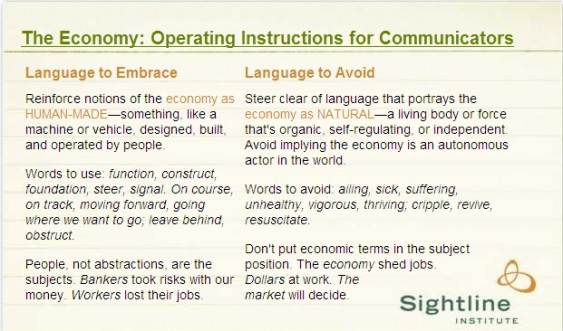To understand any big, messy concept, the human brain turns unconsciously to mental shortcuts—what communications experts call conceptual metaphors or frames.
Take common ways to talk about the economy: We say it’s accelerating or stalled; on track, going into the ditch, or crashing, like the whole thing is some kind of object in motion. Or we hear it’s thriving, flat on its back, needing resuscitation—as if the economy were a living body. Sometimes, the dollar “falls” and unemployment “rises”—like magic, all on their own!
As messaging expert and cognitive linguistics researcher Anat Shenker-Osorio reminds us, these familiar expressions aren’t merely flowery language. Our words actually shape what people think the economy is, how it should work, and what economic policies seem logical or right.
For example, if the economy is understood as a natural force—like a living body, a body of water, or the weather, the veiled message is: hands off. After all, natural entities—and especially bodies—should be free to do their own thing, right? Water and the weather do as they please even if we try to intervene! And we assume a body will take care of itself and heal on its own. In terms of policy, interventions like rules and regulations may come across as irksome or unnecessary.
On the other hand, to function properly, the economy as a human-made object—and especially a complex machine like a moving vehicle—logically requires maintenance and responsible operators. As Anat writes, these are the very assumptions we wish people would make about our economy. Namely, that it requires capable, continuous, external control.
So how should we be talking about the economy?
As part of Sightline’s strategic communication program, we regularly distill new research like Anat’s into short, scannable talking points memos—Sightline Flashcards. Below is the September Flashcard: Anat’s DOs and DON’Ts for talking about economic policy solutions. (Click here for the full, online version).

Counterproductive frames are everywhere. I can’t tell you how many times Sightline researchers have reinforced the “economy as natural” frames. I may have been the biggest offender! Over the years we’ve talked about an economy that is struggling. We’ve given the economy autonomy and agency—like it has a mind of its own! We’ve written countless times about a “healthy energy economy” and even talked up our own “prescriptions” for economic health! Our intentions were good but our words may have undermined the very solutions that we championed.
Old habits are hard to break, but our own past missteps provide a perfect opportunity to think about the wording we should be using instead. To that end, we used the guidelines laid out by Anat to critique and rewrite our own writing on the economy (Here’s the “reframe” memo.)


Comments are closed.